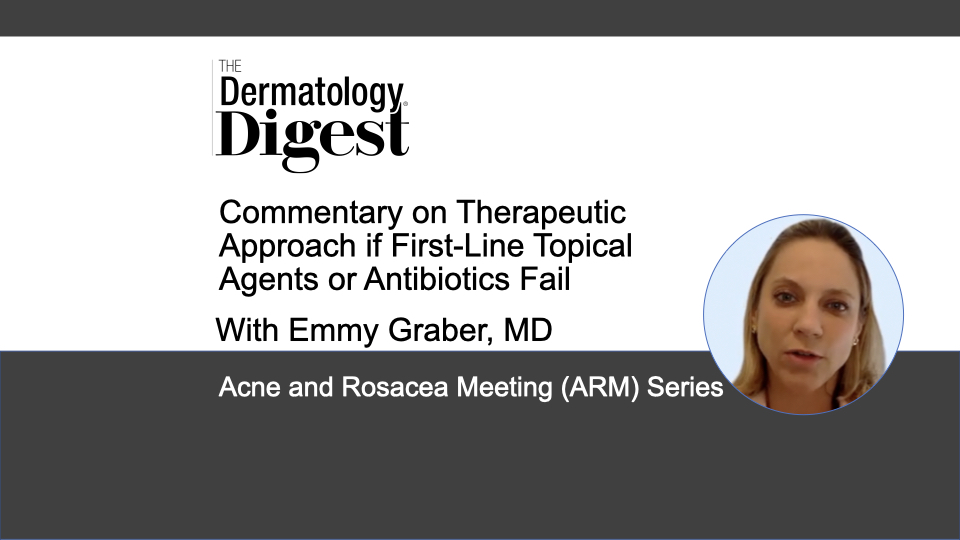Dr. Emmy Graber provides expert advice for next steps when first-line acne and rosacea treatments fail.
“[The talk] I gave in the main meeting was around what to do when first-line treatment options, fail, and some of the nuances about the other treatment options that we have,” said Emmy Graber, MD, MBA.
Dr. Graber’s talk included the role of spironolactone, isotretinoin, and diet for the management of acne.
Spironolactone, she said, is generally an option for the adult female patient whose acne flares cyclically, either before or after menses. When asked about lower age limits, Dr. Graber says there is recent research that shows spironolactone is safe in the pediatric population.
“Typically I wait until a patient has begun menstruating and I do like to see that their periods have been on a regular basis, and established on roughly a monthly schedule before starting spironolactone in pediatric patients.”
Although there are many signs that moving from conventional acne therapies to isotretinoin may be appropriate, including moderate to severe acne and scarring, Dr. Graber suggested to also consider quality of life and psychological factors in milder cases.
“If they have acne covering a broad surface area—their chest, their back, their face—and they just are not compliant with applying topical medications or, for some reason, can’t take another systemic medication, I’ll initiate the conversation about isotretinoin.”
Dr. Graber answers more on isotretinoin:
- If the patient has a history of depression, do you require a mental health professional written clearance?
- Do you have a favorite form of isotretinoin?
- How often do you have to repeat isotretinoin after a successful first course?
In terms of diet, Dr. Graber said that’s a little tricky. While there is some evidence that skim milk products may cause or worsen acne, no one really knows who this is likely to affect.
“I usually suggest a trial of cutting out dairy, especially skim milk products, and I let [patients] know, this may improve your acne, it doesn’t for everyone. But if you want to give it a try, let’s try it and see if it does improve your acne. So that is something worth considering, but it’s very hard to know for which patients that will work.”
About the Acne and Rosacea Meeting
The Acne and Rosacea Meeting (ARM) is a 2-part virtual meeting series directed by Dr. Emmy Graber that includes distinct agendas and faculty. ARM is designed to comprehensively address acne, acne scarring, and rosacea for the practicing dermatologist, including topical, oral, and laser therapies, as well as the psychological toll these conditions take on patients. The meeting series offers a total of 6 CME credits (3 per meeting) and attendance is at no cost to the physician.
Coming Soon!
The Arm Meeting Series – Fall
October 5, 2021: 8 pm – 9:30 pm ET
- Andrew Alexis, MD — “Debunking and Reaffirming Isotretinoin Myths — What’s the Evidence?”
- Eric Bernstein, MD — “Clearing the Color — Reducing the Erythema and Hyperpigmentation of Acne and Rosacea”
- Anne Chapas, MD — “Lasers and Lights for Improving Atrophic Acne Scars”
- Linda Stein Gold, MD — “Special Considerations for Treating Acne, Acne Scars and Rosacea in Skin of Color”
- All Faculty — Does Timing Matter? — Isotretinoin and Procedures
Register* Today!
*Once registered, you will have access to recorded content from the previous ARM meeting.
The ARM Meeting Series – Spring
May 11, 2011 – 8 pm – 9:30 pm ET
AGENDA
- Julie Harper, MD — “First-Line Topical Agents for Acne and Rosacea Treatment”
- Dr. Graber — “Therapeutic Approach if First-Line Topical Agents or Antibiotics Fail”
- Dermatologist James del Rosso, DO — “Considerations for Antibiotic Sue in Acne and Rosacea”
- Richard Fried, MD, PhD — “Managing the Emotional Acne or Rosacea Patient”
- All Faculty — As Us Anything (about acne and rosacea!)


